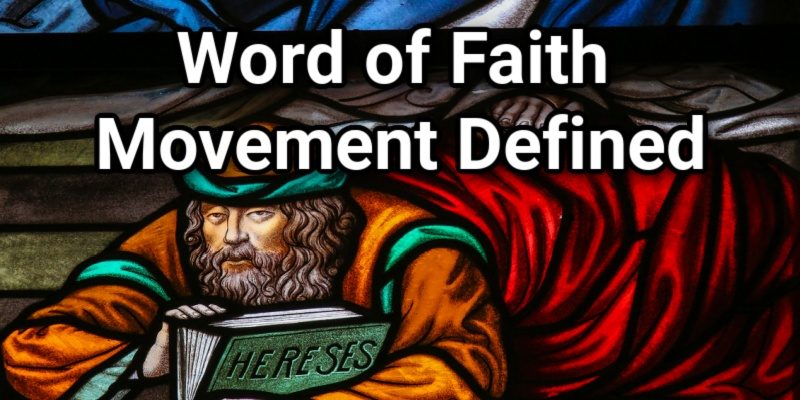Lord’s Library editors offer this brief word of faith movement defined to critique problems and dangers and to see whether it is Biblical.
A prominent theological perspective within some circles, the word of faith movement asserts that believers can influence their own health and wealth through faith-filled words and declarations. This false movement suggests that by speaking positive affirmations, individuals can “speak into existence” their own well-being, both physically and financially. However, when this doctrine is examined against the backdrop of Biblical teachings, particularly the core Christian doctrine of salvation by grace through faith in the Finished Work of Jesus Christ on the Cross, several inconsistencies emerge.
Proponents of the word of faith often cite verses like Proverbs 18:21 and Mark 11:23:
- Proverbs 18:21: “Death and life are in the power of the tongue: and they that love it shall eat the fruit thereof.”
- Mark 11:23: “For verily I say unto you, That whosoever shall say unto this mountain, Be thou removed, and be thou cast into the sea; and shall not doubt in his heart, but shall believe that those things which he saith shall come to pass; he shall have whatsoever he saith.”
While these verses do highlight the impact of faith and the significance of one’s words, the word of faith interpretation stretches these meanings to suggest that believers have near-divine authority over their own destinies. This perspective is at odds with the Biblical message that shows how salvation is a gift from God, not works righteousness like special utterances.
Word of Faith Movement Defined
See Ephesians 2:8-9: “For by grace are ye saved through faith; and that not of yourselves: it is the gift of God: Not of works, lest any man should boast.” This passage tells that neither salvation nor God’s blessing can be declared into existence by man.
The Bible shows the sovereignty of God and the importance of humility. This comes in contrast with the word of faith’s stance that promotes a form of spiritual entitlement. James 4:13-15 cautions believers against boasting about future plans without acknowledging God’s Will, first: “Go to now, ye that say, To day or to morrow we will go into such a city, and continue there a year, and buy and sell, and get gain: Whereas ye know not what shall be on the morrow. For what is your life? It is even a vapour, that appeareth for a little time, and then vanisheth away. For that ye ought to say, If the Lord will, we shall live, and do this, or that.”
The movement’s selective use of Scripture often overlooks important Biblical themes like suffering, self-denial, and the reality of trials, which are integral to the Christian experience. See Philippians 1:29: “For unto you it is given in the behalf of Christ, not only to believe on him, but also to suffer for his sake;”
As one can see, this verse highlights the expected hardships in a believer’s life, contradicting the constant prosperity preached by word of faith.
While the word of faith movement highlights the importance of faith and speaking positively, it diverges significantly from Christian teachings about the sovereignty of God, the nature of salvation, and the realities of Christian life. The real, Biblical approach encourages believers to trust fully in God’s grace and sovereignty, understanding that life’s blessings and challenges are under His perfect governance, not subject to manipulation by the words of man. This understanding fosters a deeper nd more humble faith that aligns with the overarching message of the Gospel of Jesus Christ.
Lord's Library is a Christian resource hub. Our editors use a variety of internet research methods like search engines, audio and video, AI, consultations with ministry leaders in the field, and more. Lord's Library should never be a substitute for reading your Bible daily as the Scriptures are to be our final authority on all matters. Lord's Library participates in affiliate programs. We may make a small commission from products purchased through this resource.
- What Does the Bible Say About Being Afraid? With Key Scriptures - April 26, 2025
- The Key Assurance of Salvation Bible Verses & How to Know It - April 25, 2025
- The Dietary Laws in Deuteronomy: Bible Overview & Commentary - April 24, 2025












